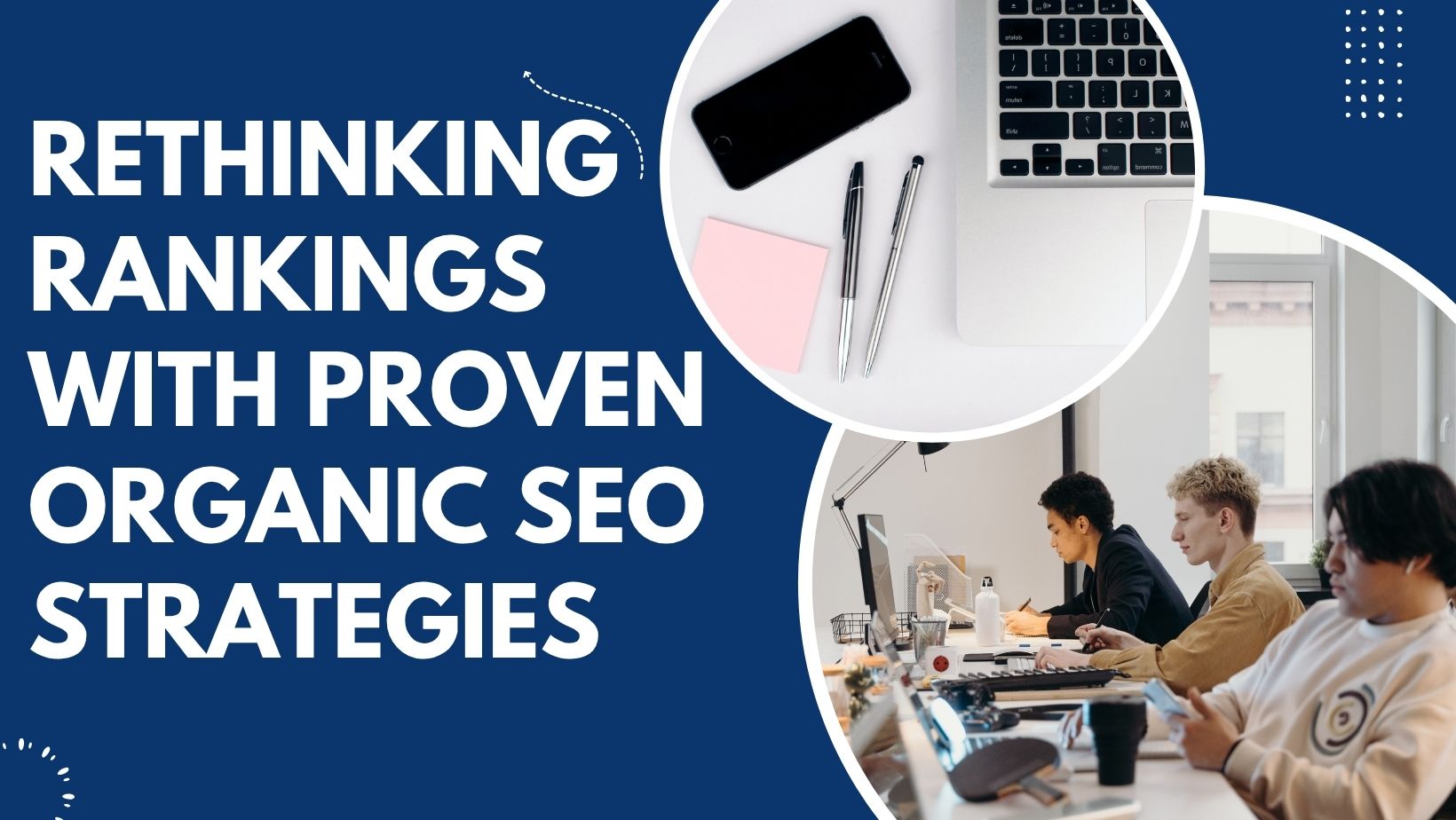
For over two decades, online visibility has been synonymous with ranking on search engines. Businesses chase the #1 spot on Google as if it’s the only metric that matters. But let’s pause for a moment. Is ranking first the same as winning online? Not necessarily.
The real question is: what are those rankings doing for you? Are they driving qualified leads, conversions, revenue? Or are you stuck in a numbers game with no clear outcomes?
Rethinking rankings isn’t just about questioning the value of a high position—it’s about asking whether your SEO strategy is aligned with your business growth. This is where proven organic SEO strategies come into play. And this is where many businesses begin to see SEO not as a checklist but as a transformative framework.
The Evolution of Organic SEO Strategy
SEO has outgrown its early, keyword-stuffing days. It has matured into a sophisticated discipline that balances algorithmic logic with human intent. Today, successful organic SEO strategies are rooted in:
- Understanding user behavior
- Delivering content that matches intent
- Structuring websites for accessibility
- Building credibility and trust over time
This isn’t about tricks. It’s about providing real value. Google’s algorithms are designed to surface results that help users. If your site doesn’t do that, you’re already behind.
Why One-Size-Fits-All Doesn’t Work Anymore
Here’s the uncomfortable truth: your business is not the same as your competitor’s. So why follow the same SEO blueprint?
Proven SEO strategies are highly contextual. They depend on your:
- Industry and niche
- Audience profile
- Competitive landscape
- Current digital footprint
The best SEO consultants build strategies that are customized. They analyze where you stand today and where your potential lies. And they bridge that gap with tailored tactics—not generic advice.
Content: The Real Ranking Currency
We’ve all heard it—”Content is king.” But in 2025, content without strategy is just noise.
Strategic content does more than inform. It drives action. It:
- Answers high-intent queries
- Reinforces brand authority
- Solves user problems
- Guides readers to take next steps
Organic SEO strategies focus on creating a content ecosystem. This includes pillar pages, cluster content, FAQs, case studies, and blogs that work in harmony. Each piece is planned, placed, and promoted with purpose.
Keyword Research Has Evolved. So Should You.
There was a time when stuffing your page with a target keyword could push you up the ranks. That time is gone.
Modern keyword research focuses on:
- Search intent
- Semantic relevance
- Long-tail variations
- User journey mapping
This means your SEO strategy should involve not just “what people search,” but why they search and what they expect to find. Great strategies turn that understanding into content and structure that delivers.
Technical SEO Is Still the Backbone
A beautifully written blog won’t help if Google can’t crawl it.
Technical SEO ensures your site is discoverable, indexable, and optimized for performance. This includes:
- Mobile responsiveness
- Site speed optimization
- Secure browsing (HTTPS)
- Logical URL structure
- Canonical tags and duplicate handling
Organic strategies integrate these elements from the ground up. They’re not afterthoughts—they’re built into your foundation.
Link Building with Integrity
Backlinks still matter. But not all links are created equal. Quality always trumps quantity.
Proven organic SEO strategies focus on earning links through:
- Authoritative guest posts
- Digital PR campaigns
- Data-driven content
- Strategic collaborations
It’s not about buying links or gaming the system. It’s about creating content and relationships that naturally attract authority.
UX and SEO: The Overlooked Connection
Ever landed on a page that ranked well—but was hard to navigate or visually messy? Exactly.
Search engines now evaluate user signals more closely than ever:
- Bounce rate
- Time on site
- Page depth
Organic SEO strategies that ignore UX are incomplete. Today, SEO is about designing experiences. Pages should load quickly, guide the eye, and provide clear paths for action.
Local SEO Is Now a Global Concern
Even global companies can benefit from optimizing for local intent. Why? Because users search with location-based context—even for national or digital-only businesses.
Proven strategies include:
- Optimizing Google Business Profiles
- Earning local citations
- Creating geo-targeted content
These approaches help businesses capture micro-moments of local relevance. And those micro-moments often lead to macro-level impact.
Real-Time Data, Real-Time Strategy
SEO is not set-it-and-forget-it. Algorithms evolve. Competitors adapt. User preferences shift.
Effective SEO strategies include:
- Ongoing performance monitoring
- A/B testing and experimentation
- Quarterly audits and pivot plans
Consultants and in-house teams alike need tools and processes to react fast. Data is only useful if it changes your approach.
SEO as Part of the Bigger Marketing Machine
SEO doesn’t exist in a silo. It intersects with content marketing, PPC, PR, social media, email, and web development.
Great strategies build bridges between:
- Organic and paid traffic
- SEO goals and brand narratives
- Editorial calendars and search demand
When SEO works with—not against—other channels, it amplifies their results too. The synergy creates compounding returns.
Trust, Authority, and E-A-T
Google’s E-A-T framework—Expertise, Authoritativeness, Trustworthiness—is no longer just for YMYL (Your Money or Your Life) websites. It’s relevant across industries.
Proven organic SEO strategies include tactics to:
- Feature expert authors
- Reference credible sources
- Update content regularly
- Display social proof and trust badges
Your online reputation directly affects your rankings. So it must be managed with care.
The SEO Strategy Checklist That Actually Matters
Here’s what most high-performing strategies include:
- Audience research and persona creation
- Keyword mapping by funnel stage
- Content calendars aligned with business goals
- Structured data implementation
- Link earning outreach plans
- Mobile-first UX design
- Conversion-focused CTAs
- Goal-based tracking in GA and GSC
Every item above leads back to one goal: sustainable, high-intent traffic that converts.
Measuring What Really Moves the Needle
You can drown in metrics. But smart SEO focuses on:
- Organic traffic growth by segment
- Keyword position trends on strategic terms
- CTR from SERPs
- Bounce and dwell time
- Leads or conversions from organic
Vanity metrics are easy to chase. Real SEO impact comes from KPIs tied to revenue or business goals. Proven strategies reflect that focus.
Strategic Patience: The SEO Advantage That Compounds
SEO isn’t instant. But it is cumulative.
The blog you publish today could bring leads for years. The technical fix you apply now prevents future index issues. The backlink you earn next month might boost your domain authority across the board.
With every strategic move, your SEO muscle grows. Over time, that becomes your competitive moat.
Common Pitfalls to Avoid
It’s easy to get misled in SEO. Avoid:
- Prioritizing traffic over quality
- Relying on AI content without editorial oversight
- Ignoring site speed or mobile UX
- Copying competitors without context
A proven strategy is proactive, not reactive. It requires thought, effort, and ongoing care.
Why You Need a Trusted SEO Partner
There’s no shortage of SEO advice online. But execution is where most businesses fall short.
An SEO partner:
- Brings objectivity and expertise
- Accelerates your learning curve
- Provides accountability
- Builds scalable processes
Whether it’s a consultant or an agency, the right partner can help you move from scattered tactics to a strategic growth engine.
Conclusion
Rethinking rankings is not about abandoning visibility—it’s about chasing the right kind of visibility. Proven organic SEO strategies prioritize user experience, long-term growth, and measurable results. And they evolve with your business.
If you want rankings that do more than look good on a dashboard—rankings that drive trust, action, and revenue—then it’s time to upgrade your SEO mindset.
And if you’re serious about that shift, organic SEO consulting is where your transformation begins.






